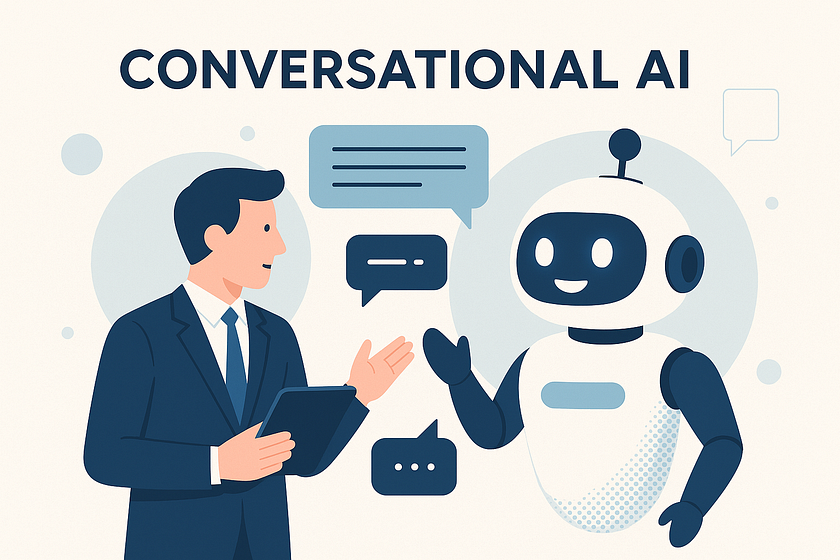Conversational AI: The Future of Human-Technology Interaction

In the age of instant messaging, voice assistants, and smart devices, conversational AI has rapidly become a key player in how we interact with technology. Whether it’s chatting with Alexa, getting customer support through a chatbot, or dictating a message to Siri, we’re witnessing a revolution in communication — and it’s driven by artificial intelligence.
But what exactly is conversational AI, and why is it becoming so important across industries?
What is Conversational AI?
Conversational AI refers to technologies that allow machines to engage in human-like dialogue. These systems use a combination of natural language processing (NLP), machine learning, speech recognition, and contextual awareness to understand, process, and respond to voice or text inputs.
In simpler terms, conversational AI powers the chatbots and virtual assistants we interact with. Unlike traditional rule-based bots that follow scripted paths, conversational AI systems learn from interactions and can respond in a more flexible and intelligent manner.
How Does It Work?
Conversational AI involves several components working together:
- Natural Language Processing (NLP): This is the heart of any conversational AI system. NLP enables the system to understand the meaning behind human language, including grammar, sentiment, and intent.
- Machine Learning (ML): ML helps the AI improve over time by learning from past interactions. The more data it processes, the smarter and more accurate it becomes.
- Speech Recognition: For voice-based AI, speech recognition translates spoken language into text so that the system can interpret it.
- Response Generation: Once the input is understood, the system formulates a relevant, human-like response and delivers it through voice or text.
Applications of Conversational AI
Conversational AI is no longer limited to virtual assistants on smartphones. It’s now a powerful tool in several domains:
1. Customer Support
Businesses are increasingly using AI chatbots to handle customer inquiries. These bots can work 24/7, respond instantly, and handle thousands of conversations simultaneously — something that would be impossible with human agents alone. They also help reduce operational costs while improving user experience.
2. Healthcare
Conversational AI is helping patients schedule appointments, get medication reminders, and even receive mental health support through AI-powered chat platforms. It also assists healthcare providers in managing patient interactions more efficiently.
3. E-commerce and Retail
Online stores use AI chatbots to assist users with product recommendations, order tracking, and even completing purchases. Personalized suggestions powered by conversational AI can significantly boost conversion rates.
4. Banking and Finance
Virtual assistants in banking apps help customers check balances, transfer funds, and get answers to common queries. These systems improve customer engagement while maintaining high levels of security.
5. Education
Conversational AI is transforming the learning experience by offering on-demand tutoring, answering student questions, and providing language learning support.
Benefits of Conversational AI
Let’s take a look at why businesses and users alike are embracing this technology:
- Availability: AI-powered assistants are available 24/7, ensuring users get support at any time.
- Scalability: They can handle thousands of queries simultaneously without fatigue or delay.
- Cost-Efficiency: Companies can reduce human resource costs while maintaining service quality.
- Personalization: Over time, AI learns user preferences and behaviors, allowing it to tailor responses.
- Consistency: Unlike human agents, AI doesn’t have mood swings or bad days — its quality remains consistent.
Challenges and Limitations
While conversational AI has come a long way, it’s not without its challenges.
- Understanding Context: AI still struggles with complex conversations, slang, or sarcasm.
- Language Barriers: Although multilingual capabilities are improving, some languages or dialects may not be well-supported.
- Privacy Concerns: Handling sensitive data requires strict security and ethical measures, especially in healthcare and finance.
- Dependency Risks: Over-reliance on AI might reduce human interaction and emotional intelligence in customer service roles.
The Human Touch: Augmenting, Not Replacing
A key point to remember is that conversational AI isn’t here to replace human interaction — it’s here to enhance it. While AI can manage routine queries and repetitive tasks, human agents are still essential for complex or emotional conversations.
Smart businesses are using a hybrid approach where AI handles the first level of interaction and seamlessly hands over to a human when needed. This ensures efficiency without losing the personal touch.
Future of Conversational AI
As technology continues to evolve, the capabilities of conversational AI will only expand. We can expect:
- More Human-like Conversations: Thanks to advancements in NLP and deep learning, conversations will become even more natural and fluid.
- Greater Personalization: AI will remember past conversations and context better, creating a more tailored user experience.
- Increased Use of Voice: With smart speakers and wearable tech, voice interfaces are becoming the norm.
- Integration Across Channels: From websites to social media to mobile apps, conversational AI will provide seamless communication across platforms.
Conclusion
Conversational AI is not just a tech trend — it’s a transformational force in the way humans interact with machines. It saves time, improves efficiency, and creates richer, more intuitive experiences for users across industries. While it’s not perfect, the progress so far is impressive and promising. As the technology matures, we’re likely to see a world where talking to machines feels as natural as chatting with a friend.
If you haven’t already, now is the time to embrace conversational AI — not just as a user, but as a powerful tool to drive innovation and growth in your business or career.



Comments
Post a Comment